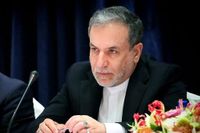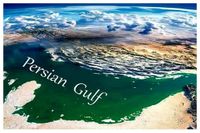On May 7, 2025, tensions flared as U.S. President Donald Trump hinted at a controversial plan to rename the Persian Gulf to the Arabian Gulf, igniting a wave of outrage among Iranian officials and citizens alike. The remarks, made during a meeting with Canadian Prime Minister Justin Trudeau, suggested that Trump was considering this change ahead of his upcoming visit to the Middle East. While the specifics of his announcement remain unclear, the implications of altering such a historically significant name have already sparked heated debates.
Trump's comments came amid reports from major media outlets, including the Associated Press and the Daily Mail, which claimed that he intended to push this name change as part of a broader agenda for his Middle Eastern tour. The reaction was swift and fierce, as political figures and ordinary citizens expressed their indignation across social media platforms.
Seyyed Abbas Araghchi, Iran's Foreign Minister, took to social media to condemn the proposed change, asserting, "The name Persian Gulf, like many geographical names, has deep roots in human history. Iran has never objected to using names like the Sea of Oman or the Arabian Sea, as these do not imply ownership by any particular nation but rather reflect a shared respect for our collective heritage." He emphasized that any politically motivated attempts to alter the historical name of the Persian Gulf would be viewed as a hostile act against Iran and its people.
Araghchi's sentiments were echoed by other Iranian officials, who warned that such actions could undermine Iran's territorial integrity. Mohammad Baqer Ghalibaf, the Speaker of the Iranian Parliament, also voiced his concerns, tweeting, "I have asked the library of the parliament to publish several historical maps of the Persian Gulf. They said there are so many that each delusional politician could have a copy. While shoes and clothes can be bought with dollars and dirhams, history and geography cannot be bought."
Adding to the chorus of dissent, former Foreign Minister Mohammad Javad Zarif highlighted the emotional impact of Trump's remarks, stating, "What we hear about the use of a fabricated name for the Persian Gulf enrages every patriotic Iranian, regardless of their political leanings. For Iran, we will show the world and the residents of the White House that Iranians, united and speaking with one voice, will not tolerate this shortsighted greed."
Iranian citizens have also taken to social media to express their outrage. A post by Trump regarding the proposed name change has garnered over seventy thousand comments from Iranian users, showcasing the widespread discontent among the populace. Many users shared historical maps and images, reinforcing their connection to the name Persian Gulf.
In a related development, Zainab Soleimani, daughter of the late General Qassem Soleimani, shared an image of a map depicting Iran and the Persian Gulf, declaring, "The Persian Gulf has always been Iran's child, and with ridiculous words, its name will not change." This statement reflects a deep-seated national pride and the significance of the Gulf's name in Iranian history.
Meanwhile, Trump's comments have not only drawn ire from Iranian officials but have also caught the attention of U.S. lawmakers. Senator Tom Cotton, a prominent supporter of military action against Iran, publicly protested against the use of the term Persian Gulf during a recent press conference, insisting on referring to it as the Arabian Gulf. This incident further illustrates the contentious nature of the name and its geopolitical implications.
As the narrative surrounding the Persian Gulf continues to unfold, many are concerned about the potential diplomatic fallout. The Iranian government has signaled that any attempts to change the name could lead to increased tensions between the two nations, complicating already delicate diplomatic relations. The historical significance of the name Persian Gulf is not merely a matter of semantics; it is deeply intertwined with national identity and pride for many Iranians.
In light of the current climate, it is critical to understand that the name of the Persian Gulf carries profound meaning, representing centuries of history, culture, and geopolitical significance. The Iranian government and its citizens view any attempt to alter this name as an affront to their heritage and a challenge to their sovereignty.
As the world watches, the unfolding drama surrounding the Persian Gulf serves as a poignant reminder of how deeply rooted historical narratives can influence contemporary political landscapes. The potential name change is not just a trivial matter; it encapsulates the ongoing struggle over identity, recognition, and respect in an increasingly complex geopolitical arena.
In conclusion, the controversy over the name of the Persian Gulf highlights the fragility of international relations, where even a name can provoke strong reactions and reshape diplomatic ties. With Trump’s administration facing scrutiny over its foreign policy decisions, this situation will likely be a significant point of discussion in the days leading up to his Middle Eastern visit.







